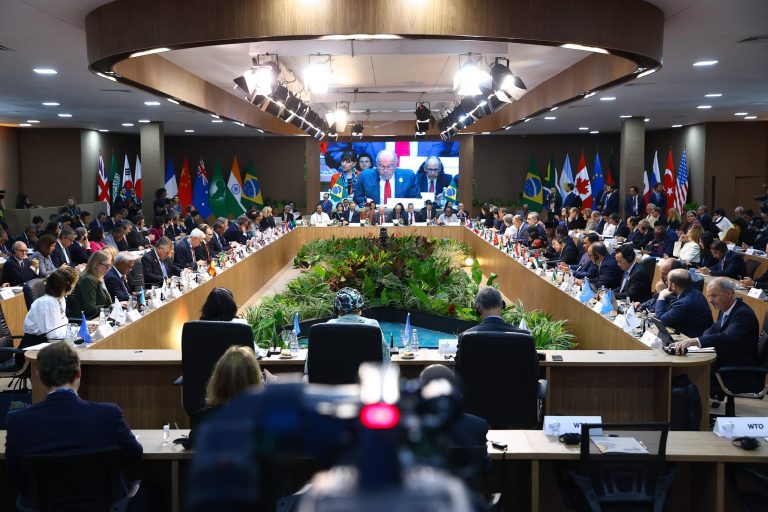São Paulo – The meeting between foreign affairs ministers of the G20 developed and emerging economies ended on Thursday (22) in Rio de Janeiro with a call for the reform of multilateral organizations. At the G20 rotating chair, Brazil chose three guiding topics for the meetings this year: fight against hunger, poverty, and inequalities; energy transition and tackling climate change; and reform of multilateral institutions.
In his closing speech, Brazilian foreign affairs minister Mauro Vieira said the ministers gathered this Thursday morning agreed that the leading multilateral institutions – including the United Nations, the World Trade Organization, the World Bank, and the International Monetary Fund – need to be reformed to “adapt to the challenges of the modern world.”
“As for the U.N., there was consensus regarding the essentiality of the organization for peace and security and the promotion of sustainable development. Therefore, all mentioned the need to propel talks on the reform of the organization and its Security Council in particular, with the inclusion of new permanent and non-permanent members, specially from Latin America and Caribbean and Africa. The different proposals in this sense need to be effectively discussed, and we have to encourage this,” said Vieira.
He added that topics discussed by the ministers included a new G20 FM meeting to be held on the margins of the U.N. General Assembly. This will be the first time this occurs. And he said there was “virtual unanimity in the two-state solution as the only solution to the Israel-Palestine conflict.”
In the parallel event titled The G20’s Role in Dealing with Ongoing International Tensions, Egypt’s foreign minister, Sameh Shoukry, said the “international system” hasn’t been able to meet the demands that the global moment requires, mentioning two central failures: the violation of international principles and laws and the lack of a unified response from the international community. Egypt as well as the United Arab Emirates participated in the G20 meetings at the invitation of Brazi.
Saudi Arabia foreign minister Faisal bin Farhan bin Abdullah stressed the importance of international institutions in keeping commitments and being clear regarding their stances, particularly regarding the Gaza Strip.
Bilateral meetings
On Thursday, Shoukry met with U.S. Secretary of State Anthony Blinken and reaffirmed the need to reach a ceasefire agreement in Gaza. On Wednesday, the Egyptian FM was with Brazil’s foreign affairs minister Mauro Vieira.
On Wednesday (20), Shoukry met with Abdullah. Saudi state news agency SPA reported that they discussed ways to strengthen the well-established partnership between the two countries. They talked about the most recent global developments, particularly in the Gaza Strip and its surroundings. Abddullah also met with Blinken on Wednesday.
G20 is composed of most of the world’s largest economies – Argentina, Australia, Brazil, Canada, China, France, Germany, India, Indonesia, Italy, Japan, Mexico, Russia, Saudi Arabia, South Africa, South Korea, Turkey, the United Kingdom, the United States, the European Union and the African Union. The heads of state meeting will be held in November in Rio de Janeiro. This week’s meetings gathered the foreign ministers.
Brazil has been the temporary chair of G20 since last December and will remain so until November 30. In addition to Egypt and the UAE, guests invited by Brazil included Portugal, Angola, Bolivia, Nigeria, Norway, Paraguay, Singapura, Uruguay, and Spain.
Translation by Guilherme Miranda




